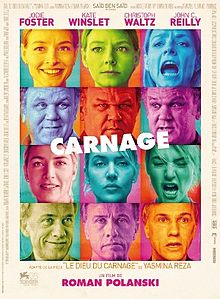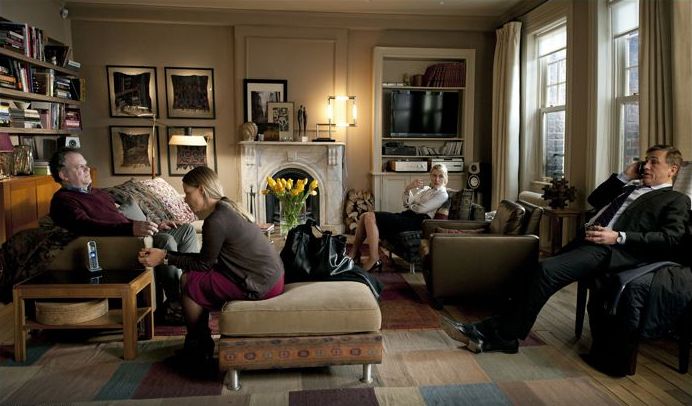 God of Carnage – a play by French writer Yasmina Reza, about two very different pairs of parents who meet-up to maturely discuss an altercation between their young children, only to descend into juvenile conflict themselves – made a sizable splash on Broadway in 2009. It won the Tony for Best Play, and Jeff Daniels, Hope Davis, James Gandolfini and Marcia Gay Harden all received nominations, with Harden taking home a prize. The play’s evenly-sized foursome of bickering and uniquely foibled characters is an ensemble wet dream for a producer trying to attract good actors for a film adaptation. As is the play’s real-time flow and single location (no costume changes! only one small set!). Of course, while that small single location may give a producer a warm fuzzy feeling in his swimsuit area, that isn’t exactly the most seductive format for a motion picture audience. Carnage, Roman Polanski’s film presentation of Reza’s play, remains faithfully and impossibly small in its scope, barely spanning a single afternoon, featuring only four speaking roles, no major plot twists or developments, and never leaving the confines of an apartment living room — it could not feel any more like a play unless it had been shot on a stage from a single angle. Unlike George Clooney’s Ides of March, which took Beau Willimon’s Farragut North and added new characters and radically changed the storyline to make it more movie-like, Polanski treats Carnage as though he had been hired to stage a revival of the play. Which means that for better or worse (depending on your tastes in movies), Polanski’s Carnage offers up the exact same treats as Broadway’s Gods of Carnage: sharp dialogue chewed and spewed by great actors. The performances soar in the small apartment, but in the end you may be left wanting more.
God of Carnage – a play by French writer Yasmina Reza, about two very different pairs of parents who meet-up to maturely discuss an altercation between their young children, only to descend into juvenile conflict themselves – made a sizable splash on Broadway in 2009. It won the Tony for Best Play, and Jeff Daniels, Hope Davis, James Gandolfini and Marcia Gay Harden all received nominations, with Harden taking home a prize. The play’s evenly-sized foursome of bickering and uniquely foibled characters is an ensemble wet dream for a producer trying to attract good actors for a film adaptation. As is the play’s real-time flow and single location (no costume changes! only one small set!). Of course, while that small single location may give a producer a warm fuzzy feeling in his swimsuit area, that isn’t exactly the most seductive format for a motion picture audience. Carnage, Roman Polanski’s film presentation of Reza’s play, remains faithfully and impossibly small in its scope, barely spanning a single afternoon, featuring only four speaking roles, no major plot twists or developments, and never leaving the confines of an apartment living room — it could not feel any more like a play unless it had been shot on a stage from a single angle. Unlike George Clooney’s Ides of March, which took Beau Willimon’s Farragut North and added new characters and radically changed the storyline to make it more movie-like, Polanski treats Carnage as though he had been hired to stage a revival of the play. Which means that for better or worse (depending on your tastes in movies), Polanski’s Carnage offers up the exact same treats as Broadway’s Gods of Carnage: sharp dialogue chewed and spewed by great actors. The performances soar in the small apartment, but in the end you may be left wanting more.
The film opens with a dialogue-free scenelet, viewed from a mute distance, in which we glimpse the story’s inciting incident: an altercation between two boys, in which one hits the other in the mouth with a stick. The altercation is simple and short, as the violence between normal young lads generally is. We then jump forward in time to the modest apartment of Penelope (Jodie Foster) and Michael Longstreet (John C. Reilly), the parents of the boy who wound up on the losing end of the fight (with two damaged teeth). Also present are the parents of the stick-wielding boy, Nancy (Kate Winslet) and Alan Cowan (Christoph Waltz). The Cowans are up-scale: Alan is a high-powered attorney who constantly interrupts the flow of conversation to answer his phone, and who seems detachedly amused by life; Nancy is more or less a do-nothing housewife, of the fancier hands-off variety, who dresses sharply and tries to present a respectable image. The Longstreets are squarely middle-class: Michael is an affable schmo, who operates his own small plumping supply company; Penelope is an over-stressed perfectionist, whose robotic no-fun nature mixes cumbersomely with her artist desires and bleeding-heart liberal beliefs. Conflict between the two couples is inevitable and flames are sparked from the film’s opening moments, when Penelope, anally writing up a letter to document the boys’ altercation, uses colored language to describe the actions of the Cowans’ son. From there things just keep spiraling, as the couples seem incapable of letting things go or even leaving each others presence, as they fruitlessly try and act like “adults.” The title refers to Alan’s half-serious espousal that there is no ‘right’ or ‘wrong’ and that he simply worships life’s one true force, the god of carnage.

It takes a talented filmmaker to build an electrifying film out of events restricted to a small single location. So everybody’s favorite sex offender, Roman Polanski, is an ideal filmmaker to try his hand at Carnage. After all, Polanski first burst onto the scene with a movie set almost entirely on a sail boat (Knife in the Water) and followed that up with one of the most famous apartment-centric films ever made, 1965’s Rupulsion. Though, those two films, like Hitchcock’s Rope or Rear Window or Bruce McDonald’s Pontypool, are thrillers; twists, complications, and outside elements keep things engaging. Carnage is just talking. Funny and interesting talking, but just talking all the same. No one is murdered. No one hallucinates nightmarish imagery. There isn’t even a fist fight. The biggest plot development in the film is when one of the characters unexpectedly vomits. It is tempting to ask what the point of this adaptation was; to bemoan that the hardly prolific Polanski used up his precious prison-evading time on a film that barely allowed him to make his presence known, instead of giving us another The Ghost Writer. But given that we don’t all live in a world where we can drop $75 to see James Gandolfini on Broadway, there is certainly merit in giving everyone an opportunity to see a nice, meaty actor’s showcase like this. Carnage may lack the sensational narrative of something like Twelve Angry Men, but it is no less of an acting melee.
It is hard to pick a winner of Carnage‘s acting rumpus, but Jodie Foster may get the crown by virtue of simply having the juiciest character. Penelope, as portrayed by Foster, should immediately be recognizable to most of us. She’s that woman you feel bad disliking so much, because she is always trying to do something positive, be it planning an office party or trying to stage a charity event, but whose overwhelming humanity is completely snuffed out by her abrasively unrelatable attitude. To put it succinctly, she is just no fun. Foster nails this character with almost devious efficiency, fostering (yay! puns!) the kind of unlikable inaccessibility we usually get from Catherine Keener, but with an added shade of pitiable cluelessness that slowly warms you to the character. Foster does the most scenery chewing, but it never feels unmotivated. By the end of the film almost every one of Penelope’s lines is screamed, with the veins in Foster’s forehead pulsing to bust. But I believed that is exactly what Penelope would do. She’s an over-reactor; she doesn’t even realize how much drama she routinely generates for herself. Which makes Reilly the perfect counter-part to Foster. Reilly, with his huge lumpy potato head, always seems to play the same character, the genial boob who wants everyone to calm down and be friends. I have yet to tire of seeing him play this character. Michael is a hoot, at first the most relatable member of the foursome, who starts to unravel when Winslet’s Nancy keeps asking probing questions about Michael’s rather heartless disposal of their family’s former pet, a hamster.
Waltz has the easiest role. Which isn’t meant to detract from the role or Waltz’s performance. But while the other three are bickering and working themselves up into a frenzy, Alan remains fixed above the fray, a smirk on his face and a quip readied in its holster. Waltz is still such a fresh actor – especially for one now functioning on the same plane as Winslet, Foster and Reilly – that each of his new roles is something of an adventure. We’ve yet to see all of what Waltz can do. I loved him here. He has the best lines, to be sure, but the Alan he creates isn’t the typical rich asshole. In a lot of ways his detached dickishness seems like the most reasonable reaction to the circular and frustratingly unending conversation that consumes the foursome. Winslet, surprisingly, is the weak link in the film. To her credit, Nancy is the least compelling character of the group, but Winslet (who I normally adore) is off her game. She seems encumbered by the unconvincing accent she gives Nancy, which is a shame since there is absolutely no reason Nancy couldn’t be British. She is by no means bad, but Reilly, Foster and Waltz are flying so high that her merely acceptable performance is rendered conspicuous.
Polanski is not as completely invisible as I may have hinted earlier. While the only outwardly notable flourish he allows himself is an evolution from simple static shot constructions to hand-held close-ups once the foursome starts getting drunk (a standard directing technique), Polanski’s is definitely doing more than making sure the actors say their lines correctly. Nothing happens in Carnage. Nothing. Yet it is charged with tension. Act I is truly agonizing, as Nancy and Alan keep almost leaving the apartment, before the larger conversation finally settles everyone into the living room. Polanski makes Reza’s scenework and dialogue hilarious torture. I’m not sure I’ve wanted a section of a movie I was actively laughing at to fucking end so badly since the infamous answering machine scene in Swingers.
Given the uncomplicated nature of Reza’s play, I’m glad Polanski didn’t add unneeded subplots, new characters, or force in reasons for the couples to leave the apartment, but for Carnage to rise above an acting showcase something needed to be done about its ending. The film boils and boils as the conversation becomes more aggressive and the couples start flip-flopping allegiances, devolving into a boys versus girls dynamic and eventually a free-for-all. But there is no actual climax, no true boiling point. Things calmly taper off, and then the film ends with a cute button gag that would be suitable as the cut-to-black point on a sitcom, but not a Roman Polanski film based on a Tony-winning play. The 79-minute run-time at least allows Carnage to be viewed as a pleasurable lark, but its non-ending makes it hard to argue that the film qualifies as much more than that.
Theater or Rental or Skip It:
Carnage is a great time, but hardly a theatrical experience. With all the movies to choose from this holiday season, this is one that can safely wait to be viewed at home without losing anything. Plus, it’s so uncomfortable you may actually enjoy being able to pause it and take a short breather.
Rating: 




Out of a Possible 5 Stars